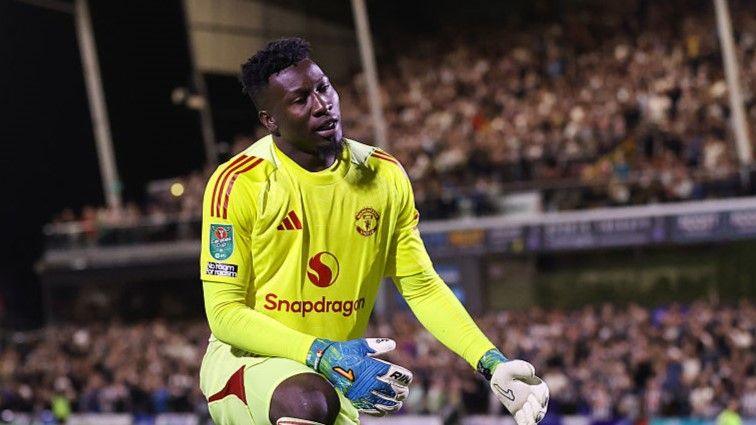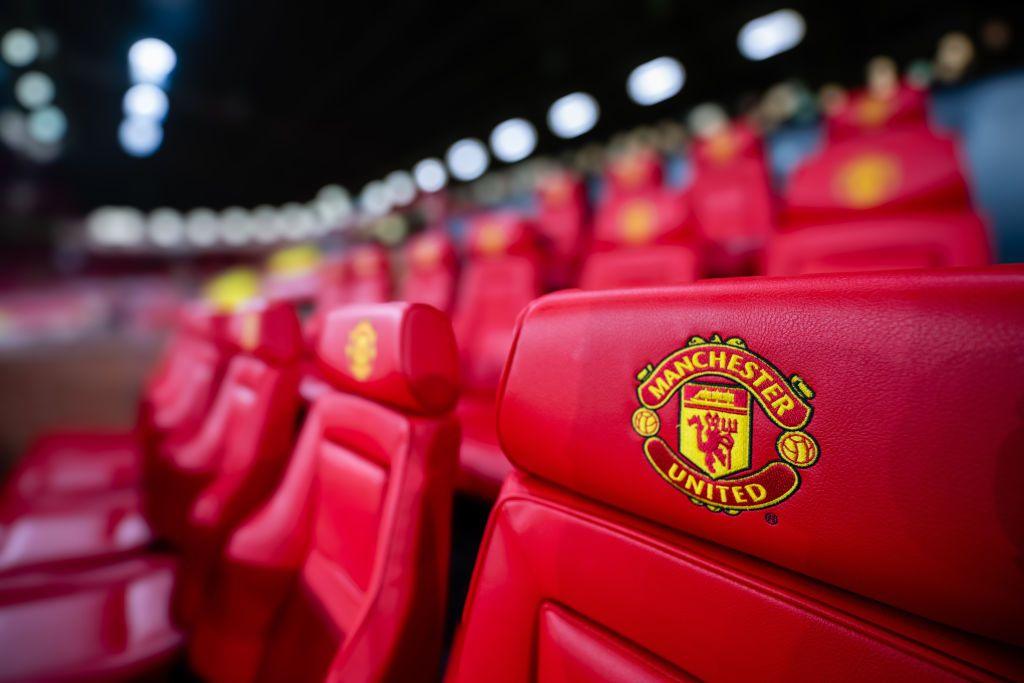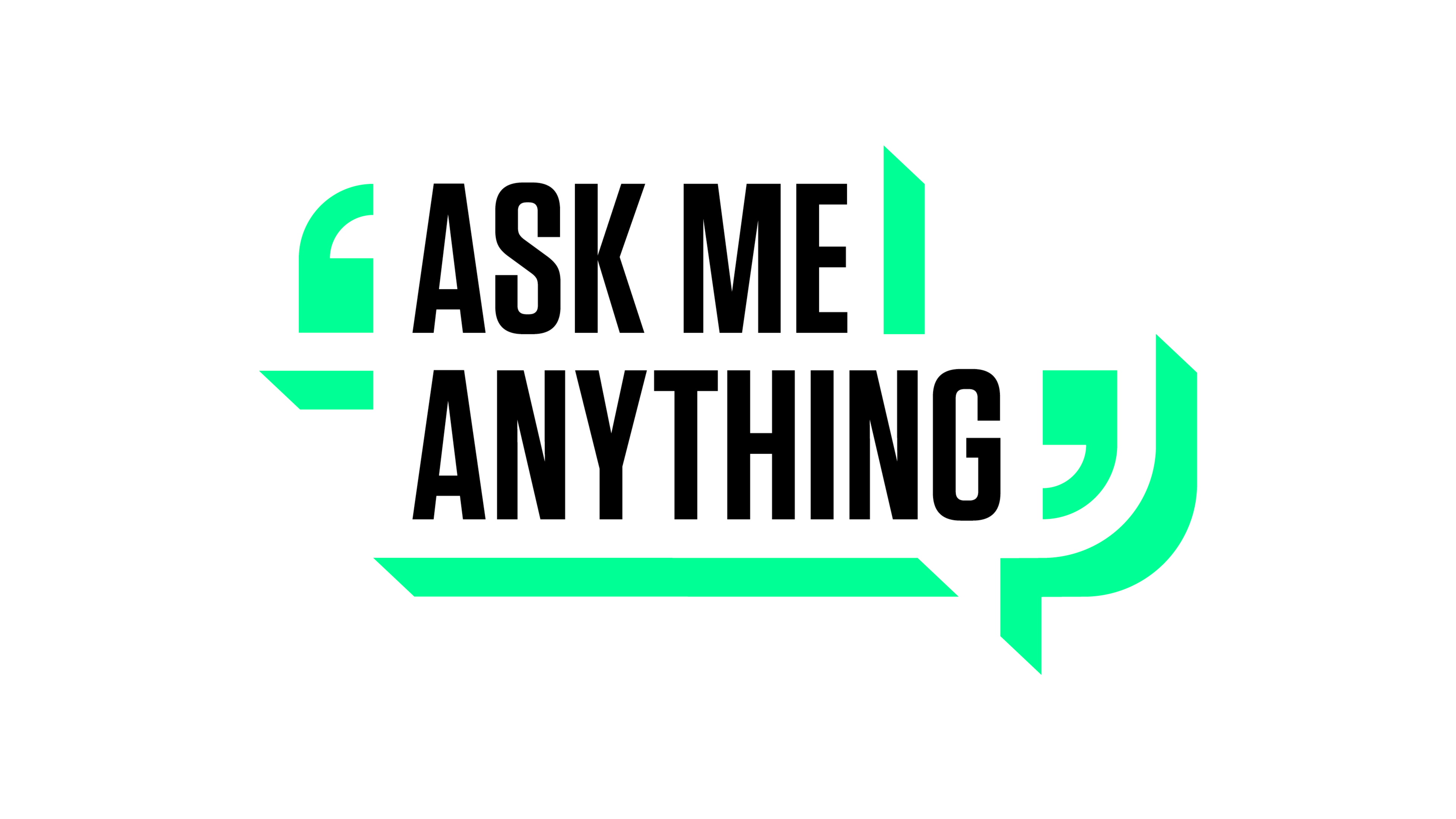'A heavy shirt to wear' - being Man Utd number one

Andre Onana's only appearance this season was in the Carabao Cup second-round defeat at Grimsby
- Published
"It is hard to be a Manchester United goalkeeper in this moment."
One of Ruben Amorim's final public statements before the international break summed up an issue that will come into sharp focus at United's Carrington training ground this week in the build-up to the Manchester derby at Etihad Stadium on Sunday.
Since Amorim spoke after the 3-2 win against Burnley, United have paid £18m to sign 23-year-old highly rated but inexperienced Senne Lammens from Royal Antwerp in preference to Aston Villa's World Cup winner Emiliano Martinez.
They have also been working towards an agreement with Turkish Super Lig outfit Trabzonspor that will allow Andre Onana, who cost United £47m when they signed him from Inter Milan two years ago, to leave on loan.
It means Amorim must stick with Turkey's number two goalkeeper Altay Bayindir, who has started all three Premier League games this season but made a major error against Burnley and another on the opening weekend that cost a goal against Arsenal, and looked shaky at Fulham, against City or hand Lammens his debut in a pretty unforgiving environment.
This will be done against the knowledge that any error will be seized upon and judgement will be instant and unforgiving.
What went wrong for Onana?
Firstly, the widely articulated view that Onana is just not very good is wrong.
Edwin van der Sar observed the Cameroon international closely for three years when he was chief executive at Ajax.
Widely acknowledged to be one of the best goalkeepers in history, Van der Sar was genuinely excited for Onana's move to United and was still backing him after a disappointing first season.
It is impossible to imagine someone as level-headed as Van der Sar would talk so enthusiastically about anyone without believing what he was saying to be true.
Onana himself has spoken about his introduction to life at United. "I arrived as the best goalkeeper in the world and boom, it went down," he told BBC Sport before the 2024 FA Cup final. "It was like, what happened?"
Sources close to Onana have said he was brought to United because of his ability to play close passes - and ended up having to go long.
Part of the reason for that was what happened on his Old Trafford debut, when he came well out of his area during a pre-season friendly against Lens and played a pass to Diogo Dalot, who then gave the ball away. Onana was chipped from 50 yards.
Erik ten Hag, who had also worked with Onana at Ajax, axed David de Gea to bring his new goalkeeper in, but the change in tactics reduced the goalkeeper's effectiveness and the regular mistakes that followed undermined confidence in Onana among supporters.
Ten Hag and then Amorim kept picking him, but a clear sign that support internally was ebbing away followed the Europa League trip to Lyon in April.
In the build-up Onana said he felt United should get through because they were "way better" than the French club.
The comment itself seemed innocuous. However, former United midfielder - and a close friend of De Gea - Nemanja Matic seized on it in the pre-match news conference, labelling Onana "one of the worst goalkeepers in the club's history".
It felt like a deliberate attempt to point score on behalf of a friend while heaping pressure on Onana at the same time.
The tactic worked. Onana made two mistakes as the first leg finished 2-2.
Amorim gave Bayindir his Premier League debut in the game that followed at Newcastle and, while Onana did appear to end the season as first choice given he started both legs of the Europa League semi-final and the final, the previous faith in him from the coaching side - Ten Hag delayed his call-up to the Africa Cup of Nations in 2024 so long that the only game he missed was the FA Cup win at Newport - had reduced.
Bayindir started the final league game of last term and then, even though Onana had recovered from the hamstring injury he suffered right at the start of pre-season, kept his place for the first three matches of this campaign.
Onana's only outing has come in the Carabao Cup defeat at League Two Grimsby, when he was at fault for their second goal.
Evidently, Amorim felt he needed a new goalkeeper. Onana is the one he has decided he is willing to do without.
Why Man Utd keepers need 'rhino skin'
United's explanation for choosing Lammens over Martinez on transfer deadline day is that they wanted someone who will be able to play a central role in their team in three or four years' time, when they hope to be challenging for major honours again.
This theory is solid.
What it ignores is the swirl of noise that gathers when any United keeper makes a mistake.
"To be the number one at United you need to have rhino skin," said Phil Jones, who made 229 appearances in 12 seasons at the club, mostly in defence.
During Jones' time at the club, seven goalkeepers featured in the Premier League - Ben Amos, Anders Lindegaard, David de Gea, Victor Valdes, Sergio Romero, Joel Pereira and Dean Henderson.
"The Manchester United shirt is a heavy one to wear," he said.
"What is absolutely paramount is that the goalkeeper is calm and can deal with certain situations. He needs to be commanding and not be flapping at crosses.
"If a goalkeeper makes a mistake, it becomes infectious very quickly and spreads through the defensive unit. If a goalkeeper made a mistake, it was almost like you couldn't get it out of your system until the next game."
That is why Jones feels De Gea - the goalkeeper he played most often with - turned out to be so good, even if he had a tough start before eventually going on to win four club player of the year awards.
"When I say rhino skin, he had it," said Jones.
"It is ruthless in a way but he almost had this ability not to care. He was quite blase about the errors he made, even in training sometimes. But when you needed him he was there."
Carroll knows impact of mistakes
De Gea, Van der Sar and Peter Schmeichel are widely acknowledged as United's modern-day great goalkeepers.
Yet there were others in between who helped the club win Premier League titles.
Mark Bosnich and Raimond van der Gouw featured in 37 of the 38 games in the 1999-2000 championship-winning campaign. World Cup winner Fabian Barthez was in goal for 30 matches of the 2000-01 title triumph. He did the same in 2002-03, when Roy Carroll played 10 times.
The Northern Irishman, who is currently working as an academy coach in Saudi Arabia, has first-hand experience of what it takes to be a goalkeeper at United.
"I arrived from Wigan in 2001," he said. "I was 23 and was behind Fabian Barthez.
"It's not easy playing for Manchester United at the moment, but it was hard back then because everyone was expecting the new Peter Schmeichel.
"Even then, if you made a mistake, it was big news. You had to be mentally strong and that is still the case.
"But we are not robots; we are all human beings. It is not so much what you do on the pitch as what you do off it."
Carroll knows the impact one moment as a United player can have.
He won a league title for the club and came on as a substitute in the 2004 FA Cup final victory over Millwall. He made 72 United appearances in total as part of a career than spanned nearly 500 senior games for 11 clubs across five countries.
Yet mention his name and the chances are the Pedro Mendes shot he dropped over the goalline and scooped to safety before the assistant referee had noticed is the moment that springs to mind.
"I made a big mistake against Spurs and that is what people talk about," he said.
"I take it. I laugh about it. At the time, I wasn't laughing because I was upset, but as you get older you get more relaxed."
Carroll is wary of pushing the mental toughness message too far because he knows repeating the message and adopting it are very different.
He talks openly about the depression - injury-related rather than down to mistakes - he suffered during his career, which is why he talks about off-field support, not just for United goalkeepers.
"Nobody taught me how to control the mental side," he said. "All I was bought to do was be a goalkeeper - train every day, play every weekend.
"I played in all the English leagues and, no matter if you are at the bottom or the top, you have to be mentally strong.
"You can be the best keeper in the world but, once you lose the mental side of it, it can break you, like it did with me for quite a while.
"That's why I try help the young goalkeepers because the pressure now is a lot more intense."

